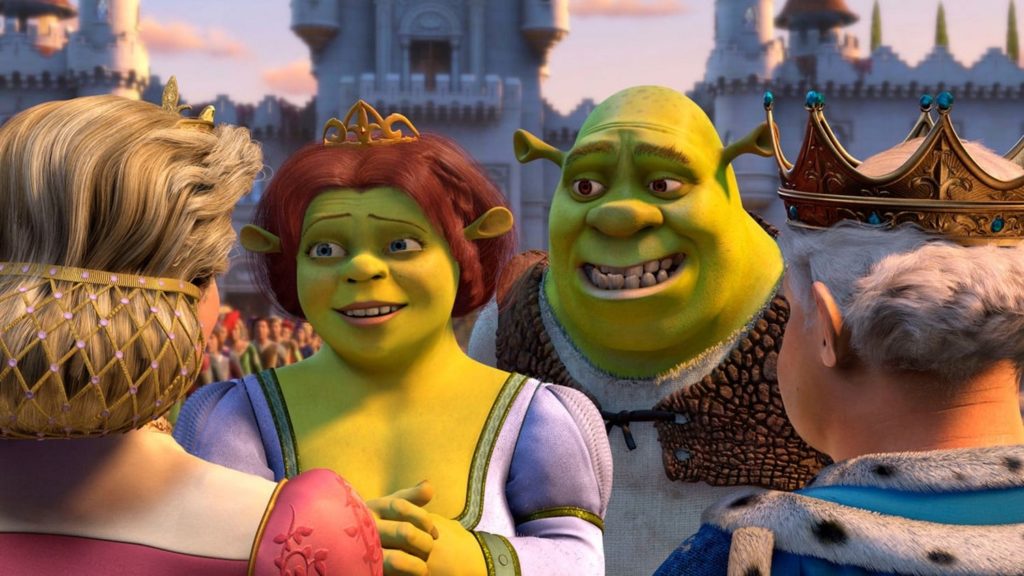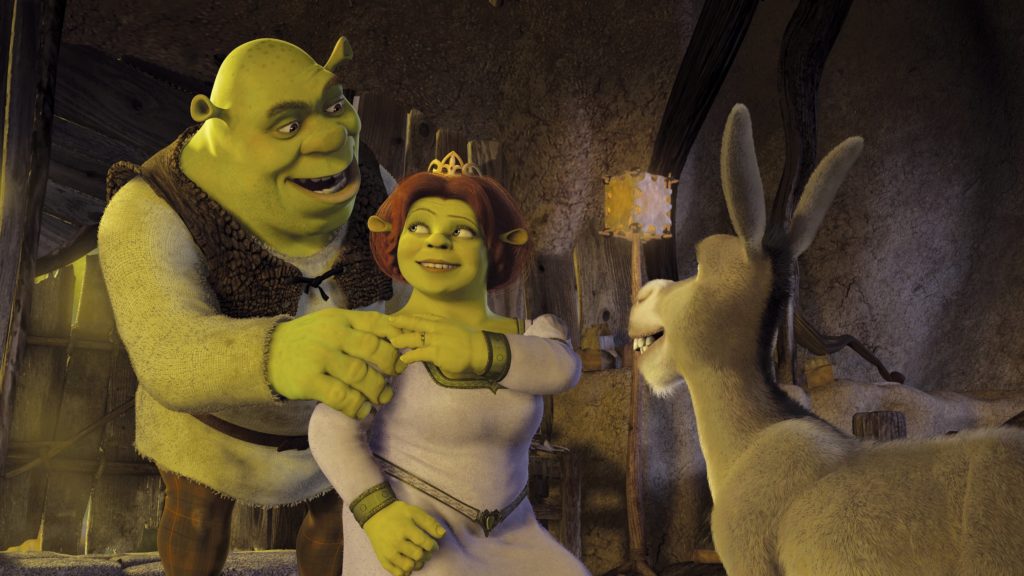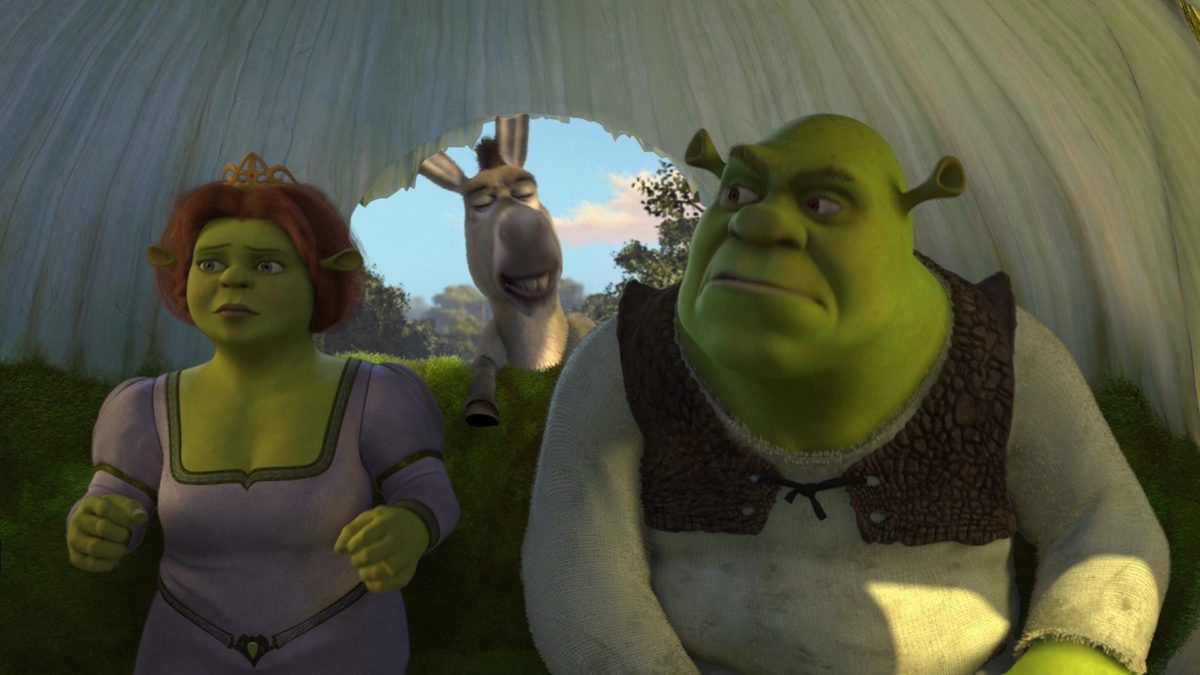The original Shrek is a movie that is easy to both underrate and overrate for reasons outside of the film itself. For one, it established a dominant format of animated comedy that had been prototyped by Aladdin a decade earlier: the celebrity-cast, postmodern, gag-forward, pop cultural reference-heavy comedy that turned fairy tales upside down. Shrek did it with more irreverence and bile (particularly towards Disney romanticism). To some observers, Shrek kicked off a dark period of commercially successful, CGI-based animation low on art but high on cheap yuks whose shadow is still felt today (see: the highest-grossing animated film of 2022, Minions 2 — which is solid, but a descendant of Shrek’s). On the other hand, Shrek became one of THE defining film for younger millennials, which translated into it becoming a staple of Internet culture where its meme legacy continues.
Despite all of that of that hullabaloo, Shrek is a narrative-driven film. At its bones, it’s more like Disney than its nose-thumbing would have you believe. Happily ever after and all. Even when the film builds to a punchline or subverts an expected beat, it’s all in favor of the adventure and romance story of Shrek (Mike Myers) and Donkey (Eddie Murphy) rescuing Fiona (Cameron Diaz) so Shrek could win his swamp back.

Thus, Shrek 2 has quite a bit of baggage and expectation it must contend with. It, first, must be a crowd-pleasing joke-machine that channels a rebellious spirit and brings in fresh cultural pulls. And, second, it must find a compelling story to tell to extend Shrek and Fiona’s romantic arc.
It is more interested in the first objective than the second objective. Shrek 2 is dense with comic material. Absolutely brimming. But as anyone can tell you, having more jokes to tell isn’t the same thing as being funnier. Shrek 2 has its moments, though a lot of it is the lazy sort of “you’ve seen this thing before!” type joke. For example, the opening has an extended riff where the entire joke is visual references to shots from Lord of the Rings as Shrek and Fiona get their wedding bands made.
The story this time takes Shrek, Fiona, and Donkey to Far Far Away to meet Fiona’s parents (Julie Andrews & John Cleese). Far Far Away is designed to evoke southern California, including the big Hollywood letters, of course. Along with her parents, there’s a Fairy Godmother (Jennifer Saunders) who runs a magic factory and has an attractive son literally named Prince Charming (Rupert Everett) who looks a lot like Jaime Lannister and seems to think he should have married Fiona.
The emotional thrust of the film is that Shrek’s incompatibility with Fiona’s parents makes him wonder whether he can ever make her happy, only for him to get a chance to be a more traditional hero: one of the Fairy Godmother’s potions turns him into a handsome human. It’s around this part of the film that movie’s narrative loses coherency: Fiona’s father tries to arrange an assassination. But the assassin, Puss in Boots (Antonio Banderas) — so obviously designed to be slapped on merchandise that it hurts to watch — immediately befriends Shrek and Donkey for unclear reasons, despite being hired to kill them and supposedly being the fiercest murderer in the land. At the same time, there’s some farcical stuff where Prince Charming is pretending to be Shrek.

It’s a shame it gets so silly because there’s a germ of an idea there in Shrek trying to confront how exactly he can make Fiona happy, only for it to get mired into narrative mess. Fiona’s parents don’t get enough depth for their relationship with Shrek or ogrefied Fiona to have much resonance, even with a fun little button about Fiona’s dad’s dark secrets.
It’s a fairly funny film, although a bit more ribald than Shrek in a way that feels very surprisingly edgy for a massive family tentpole. I hope you’re ready for some police brutality and man-in-a-dress jokes! But even the stuff that clicks has an exhaustive relentlessness to it that wears you out rather than making you laugh too hard.
Visually, it’s a better film than Shrek, but that’s not saying too much. It still looks pretty horrid from a character design and animation perspective. The cartoonier characters hold up a lot better than the humans. And the only voice acting surprise is that Saunders is great as the Fairy Godmother.
Overall, Shrek 2 doesn’t hold together nearly as well as the original except for moments at a time, like the genuinely fun kaiju pastiche with a Bonnie Raitt score in the climax. For the long cultural shadow that Shrek created, Shrek 2 is a more-is-less sequel.
Is It Good?
Nearly Good (4/8)
Dan is the founder and head critic of The Goods. Follow Dan on Letterboxd. Join the Discord for updates and discussion.

